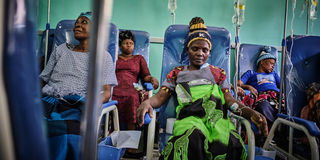Cervical cancer treatment in Nairobi offers reprieve to Malawian women

Aliyanesa Nkunye during a chemotherapy session at Queen Elizabeth Central Hospital in Malawi.
What you need to know:
- MSF has set up a temporary referral system for certain cervical cancer patients from Malawi, sending them to Kenya for radiotherapy services.
- Radiation therapy is not currently available in Malawi. Many patients in the country have been forced to seek assistance outside due to inadequate cancer diagnostic services.
Women from Malawi who recently made a trip to Kenya courtesy of Doctors Without Borders/Médecins Sans Frontières (MSF), an international emergency medical humanitarian organisation, say the radiotherapy services they received in Nairobi have been life-changing.
MSF has set up a temporary referral system for certain cervical cancer patients from Malawi, sending them to Kenya for radiotherapy services.
Radiation therapy is not currently available in Malawi. Many patients in the country have been forced to seek assistance outside due to inadequate cancer diagnostic services. According to the Catalan Institute of Oncology and the International Agency for Research on Cancer at the World Health Organization (WHO), Malawi has a population of 6.03 million women aged 15 years and above who are at risk of developing cervical cancer.
Current estimates indicate that every year 4,145 Malawian women are diagnosed with cervical cancer and 2,905 die from the disease. Cervical cancer ranks as the most frequent cancer among women in Malawi aged between 15 and 44 years.
Data on the Human papillomavirus (HPV) burden in the general population of Malawi is not yet available. HPV types 16 and 18 cause about 70 per cent of cervical cancers.
But in Eastern Africa, the region Malawi belongs to, about 4.7 per cent of women in the general population are estimated to harbour cervical HPV 16/18 infection at any given time.
Kenya has a population of 16.8 million women aged 15 years and above who are at risk of developing cervical cancer. Current estimates indicate that every year 5,236 women are diagnosed with cervical cancer and 3,211 die from the disease
Ms Chimwemwe Chiduleni from Ndirande in Malawi, a mother of two, says she was diagnosed with cervical cancer in February last year. “My daily routine has been affected by this disease. I normally wake up feeling weak and experience back and hip pain. I have since stopped working. People in this country think that once you have been diagnosed with cervical cancer you will not be cured.
“When I was told that I would be going to Kenya for treatment, I had some fears. But through the encouragement we give one another, I overcame the fears.
“I can already feel a big change in my body. I am very excited to be going back home as a healthy person,” explained Ms Chiduleni, who has been receiving treatment in a Nairobi Hospital.
She said her condition got worse because she delayed getting screened. “I am now committed to spreading cervical cancer awareness in my community. I am encouraging women to go for early screening. This disease is curable.”
Ms Nessie Kasiyabweya, 49, was in distress when got diagnosed with cervical cancer. “I am happy I came to Kenya, where there is a possibility for me to be cured.
“I finally got the treatment I needed. I am feeling much better now,” she said.
Sylvie Goossens, former MSF project coordinator of cervical cancer project, says more than 50 per cent of cervical cancer patients in Malawi seek help when the disease is too advanced to be treated either with surgery or with a combination of chemotherapy and surgery.
“The only option is to send them for radiotherapy, which is not available in Malawi.”
Dr George Chilinda, MSF surgical oncologist at Malawi’s Queen Elisabeth Hospital, said cervical cancer can be prevented by the HPV vaccine. However, the vaccine is not available in Malawi.
Screening is also a challenge because the services are not offered in most health facilities. Further, the country has an acute shortage of medical staff.
Since the beginning of its cervical cancer project in Blantyre district in Malawi, MSF has treated 4,750 cervical cancer patients including 50 who were referred to Kenya to undergo radiotherapy.
According to the World Health Organization, cervical cancer is the fourth most common cancer among women worldwide and despite being preventable, detectable and treatable, an estimated 604,000 new cases are reported and 342,000 deaths in 2020.



